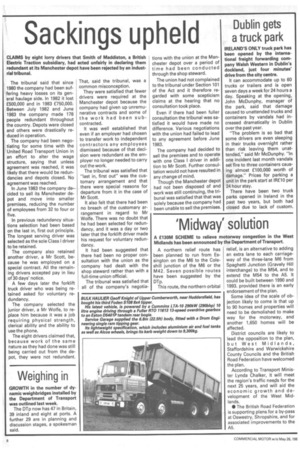Sackings upheld
Page 8

If you've noticed an error in this article please click here to report it so we can fix it.
CLAIMS by eight lorry drivers that Smith of Maddiston, a British Electric Traction subsidiary, had acted unfairly in declaring them redundant at its Manchester depot have been rejected by an industrial tribunal.
The tribunal said that since 1980 the company had been suffering heavy losses on its general haulage side. In 1982 it lost £500,000 and in 1983 £750,000. Between July 1982 and June 1983 the company made 178 people redundant throughout the country. Depots were closed and others were drastically reduced in operation.
The company had been negotiating for some time with the United Road Transport Union in an effort to alter the wage structure, saying that unless agreement was reached, it was likely that there would be redundancies and depots closed. No agreement was reached.
In June 1983 the company decided to sell its Manchester depot and move into smaller premises, reducing the number of employees from 32 to four or five.
In previous redundancy situations selection had been based on the last in, first out principle. The longest serving driver was selected as the sole Class I driver to be retained.
The company also retained another driver, a Mr Scott, because he was employed on a special contract. All the remaining drivers accepted pay in lieu of 30 days' notice.
A few days later the forklift truck driver who was being retained asked for voluntary redundancy.
The company selected the junior driver, a Mr Wolfe, to replace him because it was a job requiring physical strength, clerical ability and the ability to use the phone.
The eight drivers claimed that, because work of the same nature as they had done was still being carried out from the depot, they were not redundant. That, said the tribunal, was a common misconception.
They were satisfied that fewer drivers were required at the Manchester depot because the company had given up unremunerative contracts and some of the work had been subcontracted.
It was well established that even if an employer had chosen to transfer work to independent contractors any employees dismissed because of that decision were redundant as the employer no longer needed to carry out the work.
The tribunal was satisfied that "last in, first out" was the customary arrangement and that there were special reasons for departure from it in the case of Mr Scott.
It also felt that there had been no breach of the customary arrangement in regard to Mr Wolfe. There was no doubt that he had been selected for redundancy, and it was a day or two later that the forklift driver made his request for voluntary redundancy.
It had been suggested that there had been no proper consultation with the union as the company had dealt with the shop steward rather than with a full-time union official.
The tribunal was satisfied that all of the company's negotia tions with the union at the Manchester depot over a period of time had been conducted through the shop steward.
The union had not complained to the tribunal under Section 101 of the Act and it therefore regarded with some scepticism claims at the hearing that no consultation took place.
Even if there had been fuller consultation the tribunal was satisfied it would have made no difference. Various negotiations with the union had failed to lead to any agreement before June 1983.
The company had decided to sell the premises and to operate with one Class I driver in addition to Mr Scott. Further consultation would not have resulted in any change of mind. Though the Manchester depot had not been disposed of and work was still continuing, the tribunal was satisfied that that was solely because the company had been unable to sell the premises.








































































































